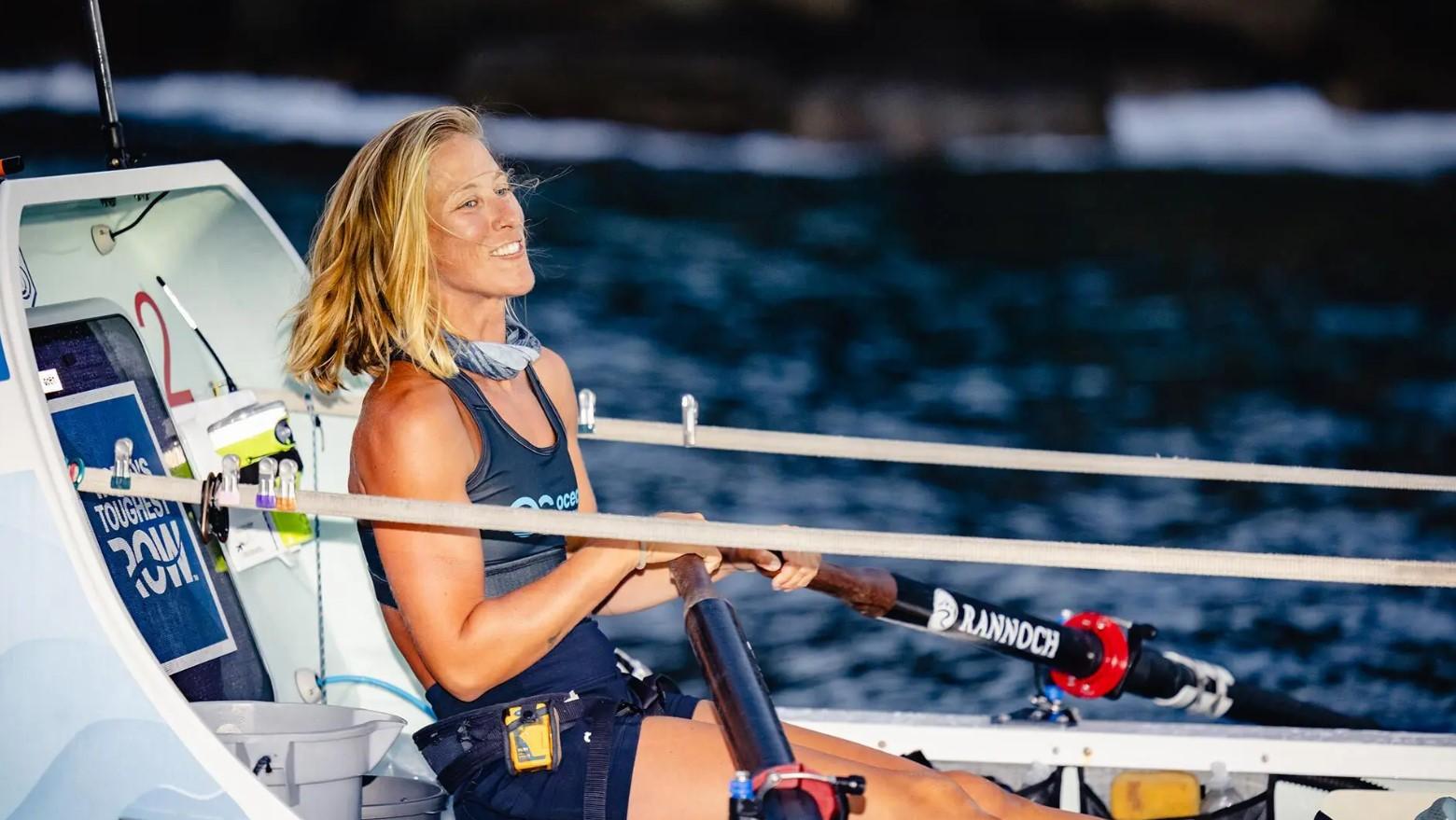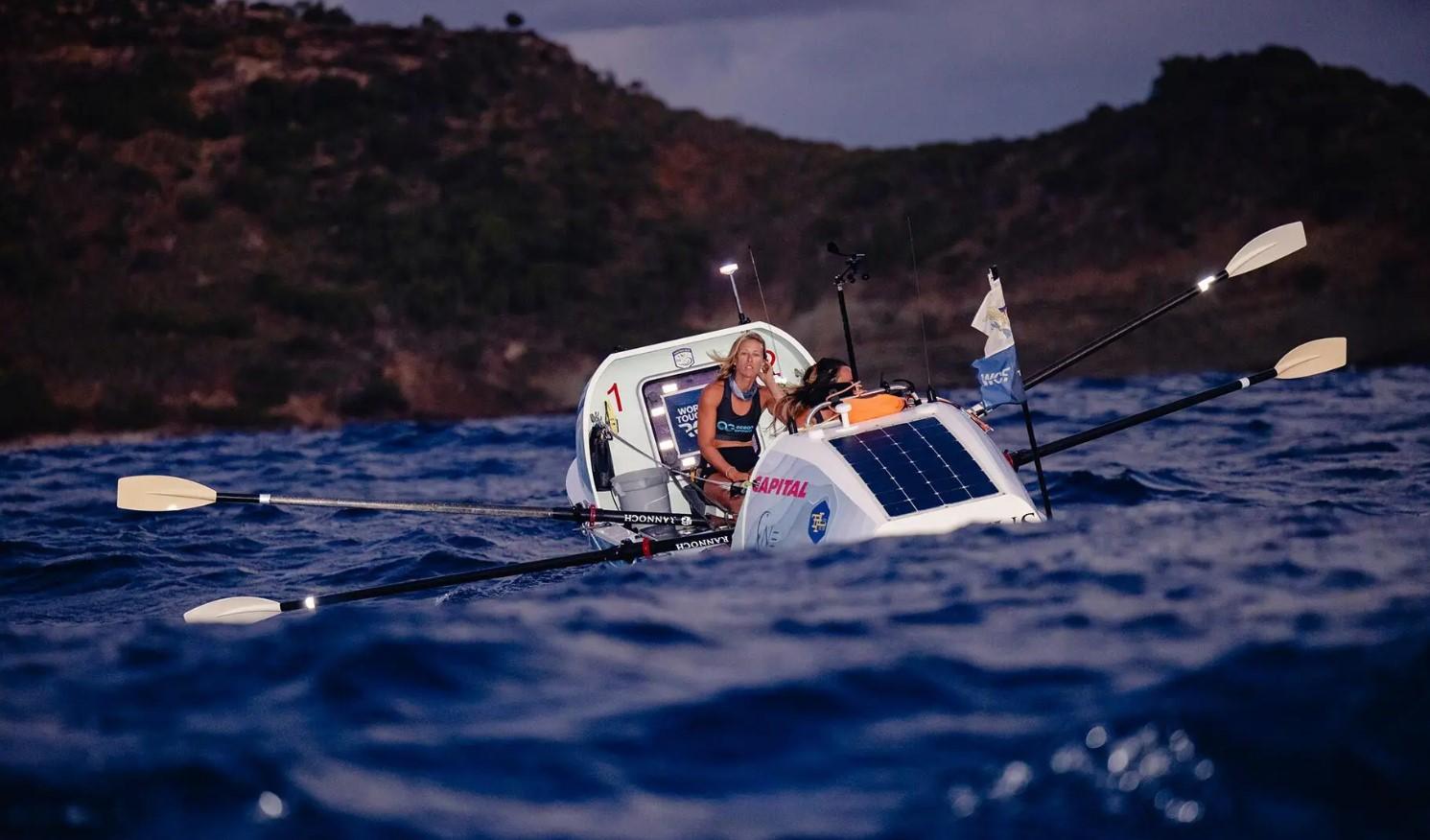Terp, Teammate Complete Race Across Atlantic in Record Time
Lisa Roland, left, and Nini Champion ’16 raise celebratory flares at the finish line of the World’s Toughest Row in Antigua last month. The pair, known as Team Ocean Grown, finished the 3,000-mile race in 45 days, one hour and 27 minutes.
Image Credit: Photos courtesy of World’s Toughest Row
For Lauren “Nini” Champion ’16, rowing a boat doesn’t so much happen gently down the stream as it does fiercely across the ocean, amid towering waves, roaring winds and unforgiving sun.
Last month, the alum completed what’s known as the World’s Toughest Row, an unassisted 3,000-mile trek on the open sea from La Gomera in the Canary Islands to the Caribbean island of Antigua. Along with her teammate, Lisa Roland, Champion lived up to her name, crossing the finish line in 45 days to set a world record for a female duo rowing across the Atlantic.
“I felt kind of a security and confidence that I just didn’t know I had,” she said. “There’s something about being in the middle of the ocean that feels kind of natural.”

The Annapolis native grew up sailing with her family and had even previously crossed the Atlantic by sailboat with them. After graduating from the University of Maryland, where she studied art and environmental science, she joined her brother in the sailing industry in Antigua, landing a job as a first mate.
That’s where she met Roland, who was also working on yachts there, and first witnessed participants finishing the annual World’s Toughest Row race.
“Seeing the rowers come in is always a really emotion-evoking experience,” Roland said. “Both of us as sailors looked at it as an additional challenge.”
They then started their “row-lationship,” as Champion calls it, forming Team Ocean Grown and spending the next three years training, including swimming, weightlifting and practicing with rowing clubs. After Champion and Roland both bounced around for their jobs, they joined up in St. Thomas, where they logged over 100 hours in their racing vessel. Named Invictus, the 7-meter-long boat features solar panels to power navigation equipment and a water maker for drinking, two small cabins and rowing stations.
Race organizers checked in with the eight competing pairs—as well as 11 solo rowers, six trios, 12 teams of four and one team of five—via satellite phone every 48 hours, but that was all the help—or outside contact—they got as they braved stories-high waves and endured sun-soaked stretches of an unchanging seascape. Those check-ins gave Champion and Roland something to look forward to, breaking up the monotony of eating freeze-dried meals, sleeping in two-hour shifts and having hours on hours to think.
“You’re finally able to get yourself into a good sleep, and then your alarm goes off,” Champion said. “Your mind wakes up first, and then you come to in your body, and everything hurts. Everything is sore. But there’s this driving force—the quicker you can force yourself to get up and throw yourself on the oars, the less of a drag it is.”

After braving a partial capsize, uncooperative winds and blazing heat, the duo closed in on Antigua with the world record in sight. They clocked in at 45 days, one hour and 27 minutes, breaking the previous record by just under six hours.
“The most memorable part of it for me was just stepping on shore and how shocked I was with how I felt in my body,” Champion said. “I honestly felt nearly intoxicated. It was like ‘motion stillness,’ I like to call it.”
The team scored another victory as well. Champion and Roland, who was raised in the foster care system, developed the Bridges Over Water fund to help young adults aging out of foster care find jobs in the maritime industry. As part of a fundraising campaign ahead of the race, they collected nearly $60,000 in proceeds to go toward 10 scholarships, with the application available now.
Now, as they work to promote the fund, they’re considering future rowing races—possibly across the Pacific next.
“I definitely think there’s a part of me that seeks interesting (challenges),” Champion said. “Maybe the Atlantic is a good starter to ocean rowing.”